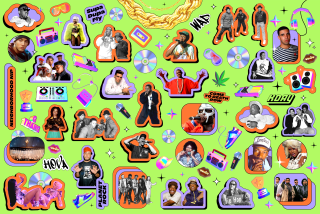Reverend Horton Heat’s Got the Rockabilly Cure
- Share via
Reverend Horton Heat may not be certified to save souls, but he has resurrected the reckless side of rockabilly and blessed it with even more bite.
“At my shows, people always scream, ‘Heal me, Rev, heal me!,’ ” says the Dallas-based singer-guitarist, speaking in a booming Texas twang. “So I just throw my drink on ‘em and say, ‘Awright, you’re healed.’ What else can I do?”
Heat’s third album and major-label debut, “Liquor in the Front,” bursts with maniacal, full-throttle rockabilly, topped by the mechanized production of industrial-rock kingpin Al Jourgensen--fittingly, the leader of Ministry.
The trio--Heat, drummer Taz and bassist Jimbo--is powered by speedy punk undercurrents, and doesn’t exactly fit in the nostalgia category. So Heat keeps company with the Seattle crowd, touring with bands such as Soundgarden. On the other hand, he’ll be opening for Johnny Cash in San Francisco next month, and he headlines his own L.A. show at the Palace on Sept. 29.
“Rockabilly is a weird thing,” says Heat, whose real name is Jim Heath. “Even when we were playing a straighter rockabilly sound, there was no place for us to fit in but alternative clubs. It all kind of fits together. Sid Vicious did Eddie Cochran songs, and the Cramps did songs by Jack Scott. Rockabilly’s got a lot of energy. There’s a lot overlooked about that genre of music.”
Rockabilly--the primal root of rock ‘n’ roll best known through the early hits of Elvis and his ‘50s followers--does resurface every so often, the last big revival coming in the mid-’80s. But that one was centered around the superficial trimmings of the genre--flashy attire, pompadours, et al--rather than its actual rebellious roots.
“The Stray Cats were a great band,” says Heat, who grew up in Corpus Christi, Tex., playing ‘50s rock, country, punk and metal. “But they were fluffy, so consequently you had a lot of bands come out at that time and all they knew was Stray Cats’ songs and that they had to have the right clothes. That was not for us at all.”
For every action there’s a reaction, so in 1989 Heat (who declines to give his age but appears to be in his mid-30s) formed the trio--known collectively as Reverend Horton Heat--as an abrasive answer to that processed rockabilly.
“It was pretty sickening and missing the initial point of what rockabilly was all about,” Heat explains. “Jerry Lee Lewis burning his piano, the Burnette brothers getting in fights on stage, Gene Vincent and Eddie Cochran getting drunk together. . . . They weren’t clotheshorses. Jerry Lee was way out of control, and that’s partly what rock ‘n’ roll is all about.”
Heat, who’s a virtual encyclopedia of Elvis, Jerry Lee Lewis and Col. Parker facts, doesn’t care which style of rock or country he’s drawing from--just as long as it bites back. “Though I love ‘50s music, rather than go see something too sweet like Buddy Holly or a cutesy country band, I’d much rather see Motorhead or AC/DC. Something that really rocks, something that’s out of the chute and you just can’t stop it.”
Lizardry: Speaking of out of control , get ready for Jesus Lizard. The adrenalized punk-rock quartet has been praised by such bands as Sonic Youth and Helmet, and its crazed demeanor has attracted a serious cult of fans that expands with each record. The Chicago band will release its fifth album next week, “Down” (on the Touch and Go label). At a time when the once-adventurous punk-rock genre has become tame and accommodating, alternative-rock Jesus Lizard has earned its fans’ loyalty by being extreme.
“With all kinds of art, its impact should be that you either really like it a lot or just hate it. Nothing passive,” says Jesus Lizard’s singer David Yow, who’s been known to foam at the mouth and writhe on stage as if possessed.
“Anything scary that you get from us comes from our music, since we don’t put that stuff across in the way we dress or marketing. It just comes from inside.”
More to Read
The biggest entertainment stories
Get our big stories about Hollywood, film, television, music, arts, culture and more right in your inbox as soon as they publish.
You may occasionally receive promotional content from the Los Angeles Times.











